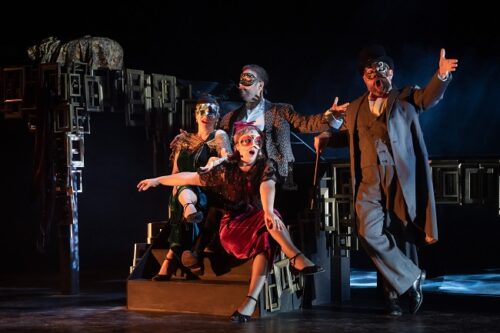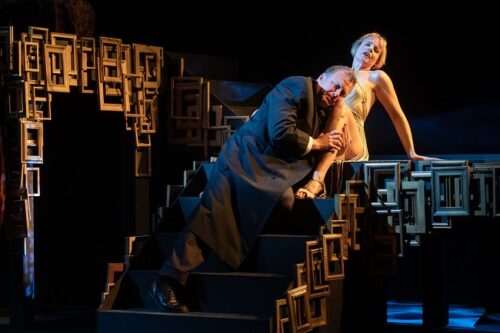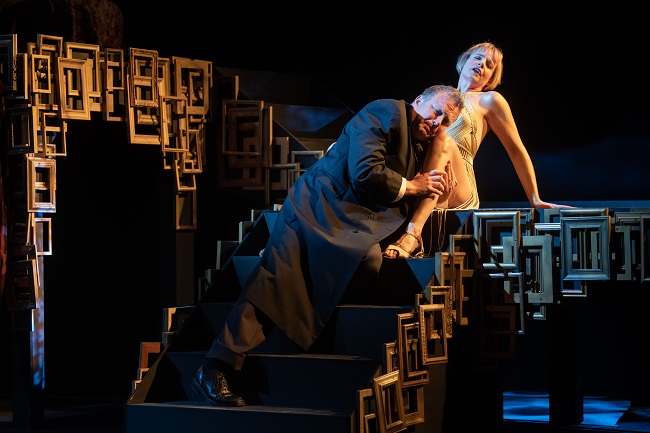 United Kingdom Longborough Festival Opera 2022 [2] – Korngold, Die tote Stadt: Soloists, Longborough Youth Chorus (pre-recorded), Longborough Festival Orchestra / Justin Brown (conductor). Longborough, Gloucestershire, 25.6.2022. (CP)
United Kingdom Longborough Festival Opera 2022 [2] – Korngold, Die tote Stadt: Soloists, Longborough Youth Chorus (pre-recorded), Longborough Festival Orchestra / Justin Brown (conductor). Longborough, Gloucestershire, 25.6.2022. (CP)

Production
Director – Carmen Jakobi
Assistant director – Nick Fowler
Designer – Nate Gibson
Lighting designer – Ben Ormerod
Movement and Intimacy director – Elaine Brown
Cast
Paul – Peter Auty
Marietta / the apparition of Marie – Rachel Nicholls
Frank / Fritz – Benson Wilson
Brigitta / Lucienne – Stephanie Windsor-Lewis
Juliette – Luci Briginshaw
Victorin / Gaston – Alexander Sprague
Graf Albert – Lee David Bowen
Longborough Festival Opera could hardly believe their good luck in securing the services of the truly remarkable Rachel Nicholls to replace the indisposed Noa Danon in the leading role. Well known to Longborough audiences from her appearances in several Wagner productions, her acting and her renowned singing capability make her the star of this production. Conductor, Justin Brown, sets her an enormous challenge in being heard above the 60 strong orchestra – about as big as the pit at Longborough can accommodate. With Erich Korngold’s score requiring extensive use of muted strings, it was surprising to witness both Rachel Nicholls and Peter Auty fighting hard to get their messages across.
Having been described as a musical genius, Korngold achieved considerable success with his early works long before his triumphant première of Die tote Stadt in 1920. Many question why the composer feels the need to retain such frenetic playing into his twenties. Assistant director, Nick Fowler, holds a view that had he come to the attention of the music world earlier in his career, the freneticism in his works would be less. Consider, too, for a moment, where he was in 1920. A Jewish 23-year-old, very much aware that Hitler was about to address his party, the then German Workers’ Party, and to change its title to the National Socialist German Workers’ Party.
Clearly, the style and talents which made him a successful composer of Hollywood film music in the 30s and 40s are revealed in this score. However, his earlier work was considered too pathetic for the tastes of the interwar period. Yet after the Second World War – a time when canonical works or absolute abstraction were the order of the day – his work was considered antiquated. For many years he struggled to establish himself in the operatic repertoire; thankfully over the past decade he has emerged strongly from the shadows.
Korngold based Die tote Stadt on Georges Rodenbach’s novel Bruges-la-Mort in which he draws attention to the close relationship between remembrance and obsession – the fine line between life and death in the novel is illustrated by the writer’s obsession with a dancer who bears a likeness to his dead wife. Longborough’s production looks at OCD and bipolar disorder and whether they overlap. Paul (Peter Auty) is recently bereaved, haunted by visions of his deceased wife, Marie. His meeting with dancer Marietta (Rachel Nicholls) only serves to blur the lines between present and past with reality itself being called into question. How can he move on or is this to be impossible?

Director Carmen Jakobi sought the advice of both a Jungian analyst and a Freudian psychoanalyst before deciding how Paul should display both bipolar disorder and OCD cause mood swings. Obsessive mourning is constant with all the symptoms of OCD fully displayed – the checking of the ‘temple of memories’ of Marie’s possessions, the symmetry and ordering (the set is a vast collection of picture frames), the intrusive thoughts with Paul constantly seeking reassurance. Jakobi’s initial research, Nate Gibson’s set design and the ever-reliable Ben Ormerod’s lighting plots work together to create one of Longborough’s more challenging and engaging productions as this fine 2022 season reaches halfway. Elaine Brown in her role as Movement and Intimacy director deserves a special mention for her work with Rachel Nicholls when asked to show very clever intricate footwork and an adventure in bed with Paul at the end of the second act, in an attempt to cure Paul’s obsessions.
Angered by Paul’s continuing intrusive thoughts, Marietta drapes the locks of Marie’s hair from the ‘temple’ around her neck. She pirouettes in an orgiastic dance shortly before her strangulation – Paul justifies his actions to his best friend, Frank (Benson Wilson), as a further attempt to liberate himself from his obsessions. Both agree Bruges is now very much a dead city!
A packed house responded to the mighty efforts of Nicholls and Auty to be heard above the powerful resonating orchestra. They managed this with aplomb as did the Loughborough Youth Chorus with their pre-recorded effort. For many in the audience this well-cast performance of Korngold’s Die tote Stadt will have been a first encounter with the output of this child prodigy, the man who wrote one of the finest of all melodies – the blissfully dreamy duet between Paul and Mariette which features the famous ‘Marietta’s Lied’ (‘Glück, das mir verblieb’). This latest Longborough production is a hugely innovative effort to portray the opera’s host city as a ghostly and lamented place of past joys. What a joy to see Rachel Nicholls in a role which contrasts sharply with her more familiar recent appearances at Longborough in Wagner. She will be warmly welcomed back.
Clive Peacock
